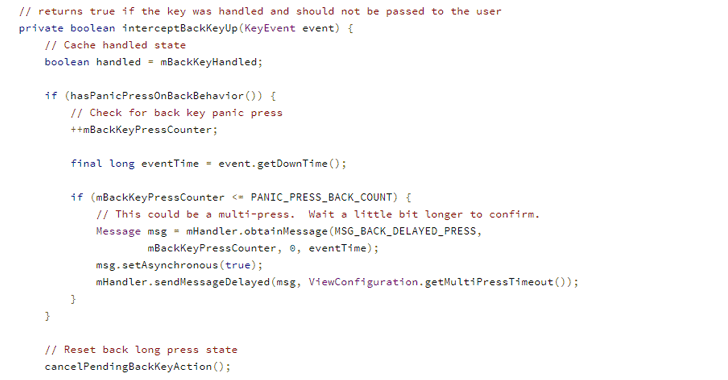How often do you click the 'back' or the 'Home' button on your mobile device to exit an application immediately?
I believe, several times in a single day because a large number of apps do not have an exit button to directly force-close them instead of going back and back and back until they exit.
Sometimes Android users expect the back button to take them back to the back page, but sometimes they really want to exit the app immediately.
Often this has severe usability implications when a majority of users are already dealing with their low-performance mobile devices and believe that clicking back button multiple times would kill the app and save memory, but it doesn't.
Google has now addressed this issue and silently included a feature within Android 7.1 Nougat that allows users to exit from apps by pressing the 'back' key successively within 0.3 seconds for over four times.
Dubbed "Panic Detection Mode," the feature runs in the background of Android operating system and detects panic in situations when a user repeatedly presses the back button on their smartphone to exit an app and allows the operating system to override the application and send the user safely back to the home screen.
While Google did not publicly make any announcement about the panic detection mode feature, XDA Developers yesterday unearthed the feature within the source code of Android 7.1 Nougat.
Since then a number of media outlets described Android 7.1 Nougat Panic Detection Mode as a security feature that protects Android devices from malicious applications.
It has been reported as a new security feature that looks for the number of times a user presses the back button within a certain amount of time and allows users to exit from the apps that go rogue and try to take control of user's device.
But the feature seems to be developed by Google engineers keeping usability as a priority, instead of security in mind.
Because activating panic detection mode neither automatically detects a malicious app and report back to Google, nor it behaves differently for a legitimate app.
However, it can help Android users in some cases to kill rogue app instantly; but again it's up to users if they are able to identify malicious apps themselves and want to remove them manually.
So, this feature is also useful if a malicious application takes control over the display and prevents you from backing out of it.
The 'panic detection mode' feature is currently limited to the devices running Android 7.1 Nougat, and not available for all the Android users, XDA Developers pointed out. The feature also needs to be manually enabled by the user.
Google fights enough to keep its Android operating system safe and secure, but malware and viruses still make their ways into its platform, especially through malicious apps even on Google's own Play Store.
It appears that Google also has plans for wider implementation of the 'panic detection mode' feature in the upcoming version of its Android OS and would most likely make it enabled by default in the future releases.
I believe, several times in a single day because a large number of apps do not have an exit button to directly force-close them instead of going back and back and back until they exit.
Sometimes Android users expect the back button to take them back to the back page, but sometimes they really want to exit the app immediately.
Often this has severe usability implications when a majority of users are already dealing with their low-performance mobile devices and believe that clicking back button multiple times would kill the app and save memory, but it doesn't.
Google has now addressed this issue and silently included a feature within Android 7.1 Nougat that allows users to exit from apps by pressing the 'back' key successively within 0.3 seconds for over four times.
Dubbed "Panic Detection Mode," the feature runs in the background of Android operating system and detects panic in situations when a user repeatedly presses the back button on their smartphone to exit an app and allows the operating system to override the application and send the user safely back to the home screen.
While Google did not publicly make any announcement about the panic detection mode feature, XDA Developers yesterday unearthed the feature within the source code of Android 7.1 Nougat.
Since then a number of media outlets described Android 7.1 Nougat Panic Detection Mode as a security feature that protects Android devices from malicious applications.
It has been reported as a new security feature that looks for the number of times a user presses the back button within a certain amount of time and allows users to exit from the apps that go rogue and try to take control of user's device.
But the feature seems to be developed by Google engineers keeping usability as a priority, instead of security in mind.
Because activating panic detection mode neither automatically detects a malicious app and report back to Google, nor it behaves differently for a legitimate app.
However, it can help Android users in some cases to kill rogue app instantly; but again it's up to users if they are able to identify malicious apps themselves and want to remove them manually.
So, this feature is also useful if a malicious application takes control over the display and prevents you from backing out of it.
The 'panic detection mode' feature is currently limited to the devices running Android 7.1 Nougat, and not available for all the Android users, XDA Developers pointed out. The feature also needs to be manually enabled by the user.
Google fights enough to keep its Android operating system safe and secure, but malware and viruses still make their ways into its platform, especially through malicious apps even on Google's own Play Store.
It appears that Google also has plans for wider implementation of the 'panic detection mode' feature in the upcoming version of its Android OS and would most likely make it enabled by default in the future releases.
Have something to say about this article? Comment below or share it with us on Facebook, Twitter or our LinkedIn Group.

